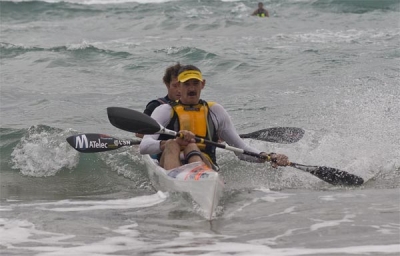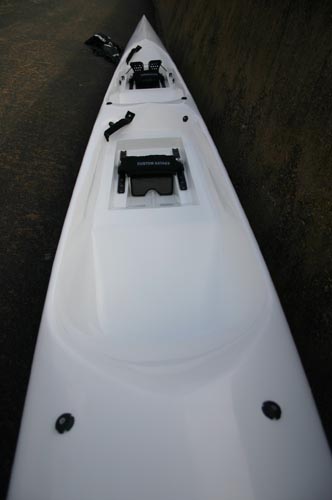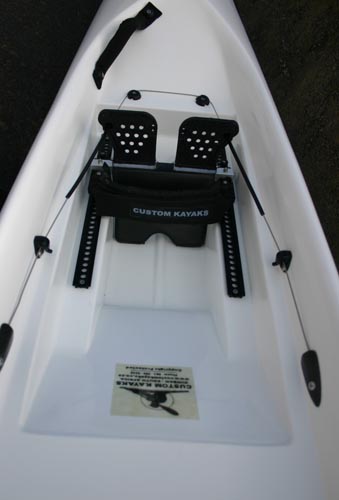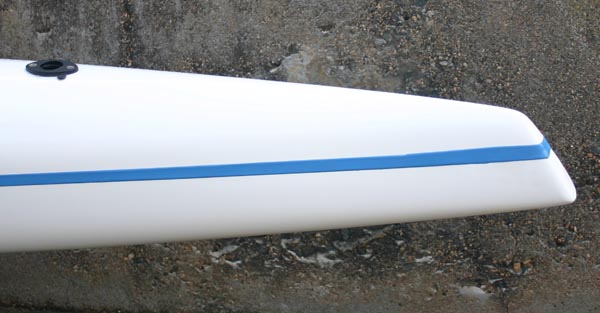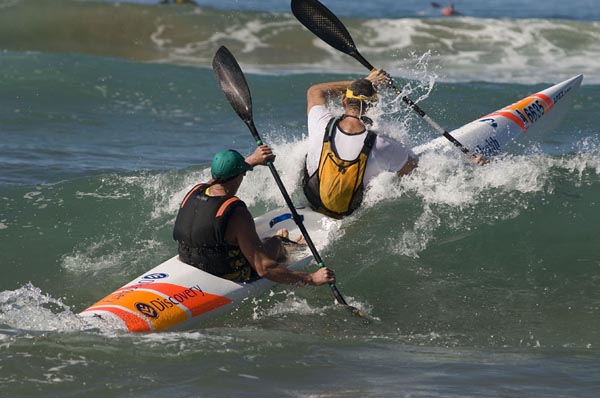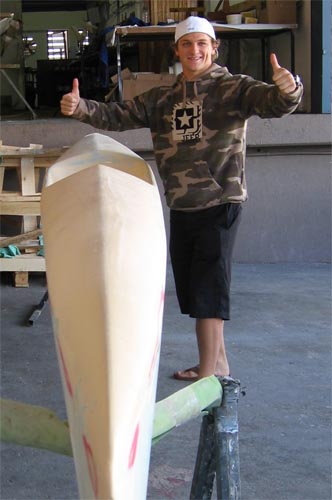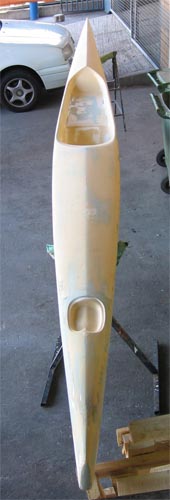Tuesday, 17 October 2023 07:11
“What the bloody hell are you doing here?” I thought to myself a few moments after launching on the brand new V10 4G for the first time. It was getting dark; it was raining; the squalls were lifting sheets of spray off the water… directly offshore. What WAS I thinking? The answer is that I’m a sucker for new toys – and if I get my hands on one, I HAVE to play with it. Damn the weather, full speed ahead… Since then I’ve paddled the boat many more times, in much pleasanter weather. Here’s what I think of this,…
Thursday, 08 June 2023 12:42
East London, South Africa: Angus Warren watched helplessly as the shark’s teeth crunched through the hull of his surfski. “It seemed to go on and on,” he says, “pushing and chomping. I was thinking, why is it not working out that it isn’t food? “I can’t tell how long it took, but I had enough time to shout a couple of times to the others.” The next thing he knew, he was in the water…
Read more...
Thursday, 27 April 2023 18:42
CAPE TOWN - Hank McGregor and Josh Fenn convincingly claimed back their Prescient Freedom Paddle title on Thursday in a dramatic race marked by tough conditions and a rain-delayed start. Conditions were extremely tough - a brisk northwester blowing spray from the big confused chop into the paddlers' faces as they headed out to the island. Huge breaking surf on the far side of the island ensured a wide line but the wind dropped as the fleet started on the journey back to the finish, making it that much more difficult and energy sapping to catch the runs.
Read more...
Tuesday, 25 April 2023 11:50
Last Friday, however, I paddled with Dawid on a windless autumn evening in Cape Town. Cruising from Fish Hoek to Muizenberg, we paddled together, stopping at all the coves to surf a few waves. In short, the operative word was "fun". This was a different Dawid - off duty - and, well, I've never paddled with anyone so noisy before. Whistling, singing, shouting to folks on shore - yahooing as he caught a wave. Heading home at dusk we crept up behind a group of seals lazing on the surface. Dawid began barking like a five-year-old paid by the bark...until…
Thursday, 09 February 2023 07:39
A look back - aaaaargh! A mountain. Let it go through... A smaller one, with a glimpse of something massive lurking further out to sea. Catch it, catch it! Sprint, sprint, you’re on it, here’s the break zone, keep going, keep going, the roar from behind and the sudden acceleration as a massive foamy caught up to me, keep it straight, keep it straight... Phew. Arrived. Panting. Stop the watch. ok. Made it. Empty the boat, pick it up to prevent it knocking you down. Done.
Read more...
Saturday, 26 November 2022 17:16
The South Africans cleaned up today at the most prestigious surfski race in Australia – arguably the most prestigious race in the world - taking five out of the top six places and the entire podium at the Shaw and Partners “The Doctor” in Perth. Defending women’s champion, Kiwi Danielle McKenzie won the women’s trophy.
Read more...
Saturday, 19 November 2022 13:01
Gold Coast paddler, Cory Hill, took first scalp in the five-event ocean ski racing series, the Shaw and Partners WA Race Week, winning the inaugural race today, the 24km Fenn West Coast Downwinder from Fremantle, just south of Perth, to Sorrento Beach. In fine conditions with a 16 knot SSW wind courtesy of the famed Fremantle Doctor, the start off Port Beach was intense with the top paddlers in a terse battle to make the first break. But it was 33-year-old Hill – the 4-times DOCTOR champ who relishes the Perth conditions – who was able to shake the field…
Read more...
Tuesday, 16 March 2021 13:54
It’s not easy to catch a rolling, runaway single ski in 30kt of gusting wind – and as they attempted to grab it, Alex and his doubles partner lost their balance and fell into the water. By the time they’d remounted, the single ski was gone – blown away by the strengthening near-gale. They turned and paddled back upwind to find their buddy.
Read more...
Wednesday, 03 March 2021 12:08
Accident reports are easy to write when the story ends happily, but this one didn’t and it’s with a very heavy heart that I’m writing this, with a view to learning what we can from it.
Read more...
Wednesday, 15 July 2020 09:13
When the NSRI found Duncan MacDonald, he was approximately 6km off Smitswinkel Bay, drifting rapidly further offshore. Gale-force squalls whipped sheets of spray off the waves, reducing visibility almost to nothing. What Happened? Given the small size of the surfski community, there’s always intense interest whenever there’s a rescue. What happened? What did they do wrong? What can we learn from it? Clearly there are lessons to be learnt from any mishap – so here’s a description of what happened, shared with the permission and cooperation of the folks involved in the hope that we might all learn from this…
Friday, 24 April 2020 11:41
Durban – As the continued coronavirus lockdown grips the country, Canoeing South Africa will host a 24 hour Canoeing4COVID-19 event this weekend as a way to raise funds for members of the broader paddling community that have been badly affected by the lockdown.
Read more...
Wednesday, 11 March 2020 14:35
“Hey, Rob! Help!” The shouts penetrated the sound of the howling wind and crashing waves – and even through the noise it was obvious from the tone of his voice that something was seriously wrong. I turned and headed back upwind.
Read more...
Tuesday, 03 March 2020 14:43
Many paddlers use Personal Locator Beacons, or tracker apps like SafeTrx on their mobile phones. But handheld VHF radios are also a great choice to consider – especially when they’re DSC-capable like the Standard Horizon HX870E.
Read more...
Monday, 24 February 2020 12:01
I finally got my hands on a demo Fennix Swordfish S this weekend and did two Miller's Runs in succession to see if I could feel any difference in handling between the 2018 Swordfish S and the new Fennix model. Conditions were challenging: False Bay was covered in whitecaps, whipped by a combination of a 25-30kt southeaster and small, confused seas. The result? I definitely want to spend more time in this boat.
Read more...
Thursday, 26 December 2019 10:30
The shark smashed like a freight train into Roger Swinney’s surfski in an explosion of noise and spray, knocking him off into the water. “I managed to get back on the ski,” he said, “but I fell off again and as I remounted the second time, I saw the swirl and tips of the shark’s fins. “I didn’t see it clearly, but from the force of it and the movement in the water, it looked big!”
Read more...
Latest Forum Topics
-
- Kai Waa Vega Arc
- 5 hours 47 minutes ago
-
- Paddling with rotator cuff injury
- 7 hours 17 minutes ago
-
- Nelo Vanquish AIR review
- 17 hours 36 minutes ago


